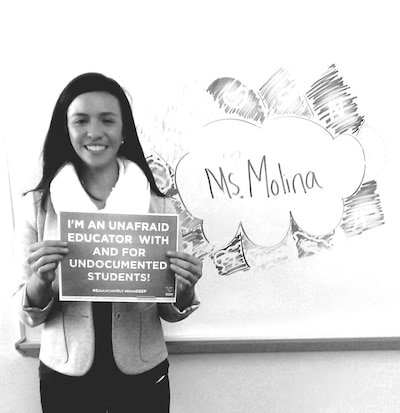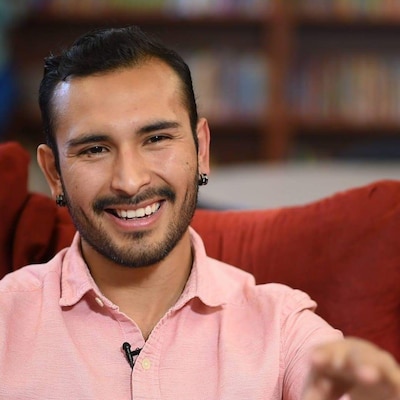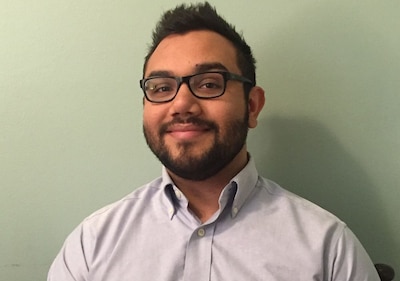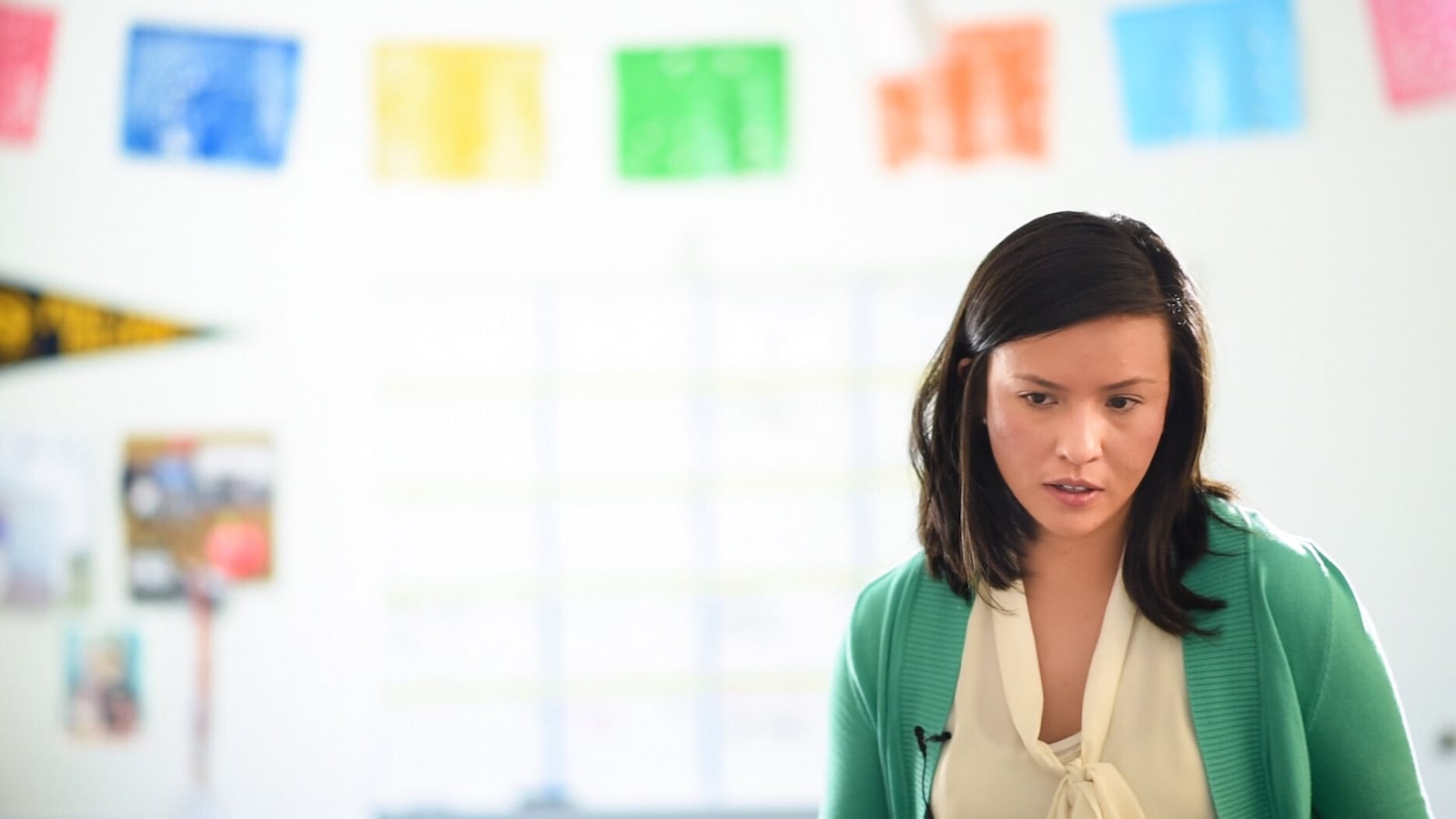For three Denver educators, life in Donald Trump’s America is a big unknown.
They worry the president-elect will erase the protections that allowed them, as undocumented immigrants brought here as children, to step out of the shadows and into the classroom. All three were inspired to teach by the teachers who helped them succeed in a new country.
Marissa Molina came to the United States from Mexico when she was 9. Before her first day of school, her uncle armed her with the phrase, “I don’t speak English.” The librarian read Clifford the Big Red Dog with her after school to help her learn the language.
Alejandro Fuentes left his native Chile when he was 4 to join his mother in the United States. When he repeated for her the first sentence his teachers taught him to say in English — “My name is Alex and I like to learn” — she cried.
Carlos Ruiz’s mother brought him to the United States when he was 6 to give him a better shot at graduating high school and going to college, which she hadn’t been able to do in Mexico.
When Ruiz was in 11th grade, she gave a speech about what it meant for her and her son to be undocumented. A local college president was in the audience. Afterward, he gave her his card and offered to help. Ruiz said he never would have been able to afford college otherwise.
“It wasn’t until the middle of college that I realized not everybody’s parent gives a speech and the president of a university happens to be there,” Ruiz said. “That’s when I realized wanted to go into education so I could open the doors for other students.”
Ruiz, Fuentes and Molina became teachers through Teach for America, a national organization that recruits college graduates to teach in low-income schools. Starting in December 2013, the organization began deliberately seeking out graduates granted work permits and exemption from deportation through President Obama’s Deferred Action for Childhood Arrivals policy.
Known as DACA, it was created by executive action in 2012 to give protections, but not citizenship, for two years at a time to undocumented immigrants who came here as children.
Trump has said he plans to reverse Obama’s executive actions, including DACA.
If that happens, the nearly 750,000 young immigrants shielded by DACA would be forced into the underground economy. Ruiz, Fuentes and Molina could no longer work in public schools.
“Teachers have such a huge potential for change and being positive … influences on students,” Fuentes said. “The fact that would not be something I could do deeply saddens me.”
We spoke with all three educators, who are in their early- to mid-twenties, about their lives and careers — and how a presidential election in which they weren’t allowed to vote could profoundly alter them.
•••
Marissa Molina grew up in Glenwood Springs on Colorado’s Western Slope. Her family, fearful of the repercussions, instructed her never to speak about her immigration status.
“That created a lot of shame for me,” she said. “My story and my struggles, instead of being something I was proud to overcome, really was just a sense of embarrassment.”

It wasn’t until her senior year of high school, when she was working with her school counselor on scholarship applications, that she admitted to not having a Social Security number.
“Instead of making me feel like a terrible person, he was like, ‘Let’s get to work. Let’s figure out how you’re going to get to college,’” she remembers. “That sense of empowerment he gave me to advocate for myself was something I had never felt before.”
Molina ended up enrolling at Fort Lewis College in Durango as an international student, but paying tuition was a struggle. She cleaned houses with her mom and tutored fellow students in Spanish to help her parents with the bill. But by her junior year, their resources were tapped.
“I remember having serious conversations with my parents: ‘I’m not going to do this anymore, I don’t want to live this lie. What does it mean if they give me a piece of paper that I graduated and then I can’t use it?’” she said. She told them she was thinking of going back to Mexico.
Her mother begged her to have faith. That summer, Obama announced DACA. One of Molina’s friends called to tell her about it. “I will never forget because I was cleaning windows with my mom and saying, ‘You were right. I just had to have a little bit of faith,’” she said.
Molina applied right away and then secured a scholarship to help pay for her senior year. As she was deciding what to do after graduation, she came across Teach for America, which had placed its first two “DACAmented” teachers in Denver. Though she had majored in political science and economics — not education — Molina felt called to give back.
“This was a way to say, ‘Thank you for what you’ve done for me. Let me pay it forward by helping other kids achieve,’” she said.
Last school year, Molina taught Spanish at DSST: Green Valley Ranch High School, a charter school in far northeast Denver. While the student body was more than 50 percent Latino, Molina said she was the only Latina teacher. That made a difference to her students, she said.
One comment in particular stuck with her.
“The student said, ‘This is the first time in a classroom where I can have a conversation about race and immigration without feeling sick to my stomach. … Listening to her tell us her struggle as a Latina woman helps me understand how I can do it,’” Molina recalled.
This year, Molina is the community engagement coordinator at Rocky Mountain Prep, which has three charter schools in Denver and Aurora. In that role, she helps families — the majority of whom are Spanish-speaking — advocate for their children.
Molina said she followed the presidential election closely and even knocked doors for Hillary Clinton. Trump’s win, she said, was painful. “When I woke up Wednesday morning, it was hard not to feel that all of the people who voted for him had directly voted against me,” she said. “It was a lot of reminding myself that’s not necessarily the truth.”
Whatever happens with DACA, Molina said she’s confident she’ll be OK because the education she received in the United States opens doors for her here and abroad.
And frankly, she said, living with fear and anxiety is nothing new for her and millions of other undocumented immigrants. The difference now, she said, is that she’s willing to share her story. And because of that, Molina said she received several texts after Election Day from people pledging to stand with her. One of them was from a former student.
It read, in part, “You’ve never given up on yourself and never given up on your community. You’re a remarkable role model in my life,” Molina said. That, she said, was a call to action.
“I taught 120 young kids who are looking to me and saying, ‘Now what?’” Molina said. “I want to be able to show them it is possible to stand up for what you believe without hating other people.”
•••
Alejandro Fuentes spent his childhood in California. His mother and stepfather worked low-paying jobs and his family moved around a lot. In third grade, he went to seven different elementary schools.
Because he’d been identified as “gifted and talented,” he recalls that teachers were always pulling for him. For sixth grade, he was encouraged to apply to The Preuss School, a highly-rated San Diego charter school for low-income students.

His first two years there, Fuentes said he was the class clown. Then, when he was in eighth grade, his family was evicted from their home. It was a personal blow for Fuentes, but his advisory teacher took him under her wing, encouraging him to focus on school.
Although she didn’t share his experience, Ruiz said she showed him great empathy. “She was consistently there,” he said. “It helped to have somebody who seemed to care.”
School became Fuentes’s refuge. He’d leave his house at 6:30 a.m. and not get home until 7:30 p.m. He became a straight-A student involved in myriad after-school activities: National Honors Society, robotics club, lacrosse and cross country.
Though he knew he didn’t have papers or a Social Security number, he didn’t realize what that meant until it came time to apply to college. Again, his advisory teacher was there to help. He ended up going to Whitman College in Washington state on a full-ride scholarship.
He majored in psychology but in his senior year, he began to wonder if it was worth it. Facing life without a work permit, Fuentes had resigned himself to the fact that he’d probably graduate and return to California to work construction alongside his stepfather.
“I felt kind of hopeless because I knew how much my dad was getting underpaid because people know he’s undocumented,” he said.
What he really wanted to do was become a teacher. Teach for America had come to his college on a recruiting trip and Fuentes was intrigued by the idea of changing young people’s lives the way his advisory teacher had changed his.
But that was before DACA, and the organization had never had an undocumented teacher. He remembers being told, “we’re not sure we can take you, but please apply.”
Shortly thereafter, Obama announced the policy. Teach for America accepted Fuentes and placed him at DCIS at Ford, an elementary school in far northeast Denver. In the fall of 2013, Denver was the only city in the country that had agreed to take DACA teachers.
His first ever day of teaching, he shared his story with his students. “I found this quote … ‘Everything is hard before it’s easy.’ I relate it to that quote,” Fuentes says. He tells his students that if they believe they can overcome their obstacles, they will.
Now in his fourth year as a teacher in Denver, Fuentes recently accepted a new job teaching sixth-grade math at KIPP Montbello College Prep middle school. The day after the election, he said he showed up to school with tears in his eyes.
“At the beginning of every class, students were coming up to me and asking if anything was wrong,” he said. “So I figured it was as good a time as any to tell them my story, my fears of losing my job and not being able to stand in front of them and be the teacher I want to be.”
Fuentes said he worries about no longer being able to financially support his parents — he makes more than both of them combined — and about deportation.
On the one hand, Fuentes said he felt uncomfortable sharing his burden with his students. But on the other, he said he was comforted by their words. “It was a lot of, ‘Don’t worry, Mr. Fuentes. We won’t let anybody take you,’” he said.
Fuentes is struggling with what he would do if DACA were repealed. Would it be better to go into hiding? Or to continue speaking out? He said he’s leaning toward the latter.
“We tell our students that if you’re working hard enough and doing the best you possibly can and showing to everyone who you are and what you stand for, life could eventually work out for you,” he said. “And so I guess I’m trying to be an example of that advice I’ve given to my students: Put yourself out there and people will support you.”
•••
As a high school student in Tennessee, Carlos Ruiz wasn’t motivated. He had poor grades and a low ACT score. Knowing that he was undocumented, “I didn’t see the point of it,” he said.
When DACA was announced his freshman year at Trevecca Nazarene University in Nashville, he said it changed his whole outlook. Ruiz applied the very first day possible.
“DACA was an avenue for me to work hard and do what I wanted with that,” he said. “It made me feel in control and empowered.”

A history major, Ruiz decided he wanted to become a teacher. He said he hoped to convince teenagers who felt as hopeless as he had to stay the course. “You don’t know what’s going to change, you don’t know what’s going to happen,” he said.
He applied to Teach for America and was placed at an elementary school in Denver. Realizing his passion lie in working with high school students, Ruiz left the organization. This year, he’s a Spanish teacher at STRIVE Prep Excel, a charter high school in the northwest part of the city.
His students, the majority of whom are Latino, know his story. Ruiz said it’s a point of solidarity: Even though most of them were born here and are citizens, many have undocumented friends or family members. The day after the election was difficult, he said.
“There was a lot of anxiety in the building,” Ruiz said. But, he added, “as the day went on, I felt better and continue to feel better. I grew up without DACA. DACA is a relatively new development. It’s hard having tasted freedom and knowing it might be taken away. But you have to look at it like, whatever happens, I will be OK.”
Ruiz said he’d be lying if he said he hadn’t searched job websites in Mexico, a country he hasn’t stepped foot in since he was a child. But being undocumented and growing up surrounded by uncertainty about his future has taught him to focus on what he can control and not dwell on the rest — a lesson he hopes to pass on to his students.
“That’s the mentality I’ve reverted to: Hope for the best. Keep on staying level-headed for myself and for my students. And continue to speak about it in an educated way because I sincerely believe that when people hear our stories, they will be supportive and change will come.”

